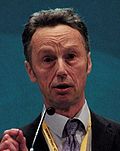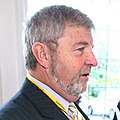Frontbench Team of Nick Clegg | |
|---|---|
| 2007–2010 | |
 | |
| Date formed | 18 December 2007 |
| Date dissolved | 6 May 2010 |
| People and organisations | |
| Monarch | Elizabeth II |
| Leader | Nick Clegg |
| Deputy Leader | Vince Cable |
| Member party | |
| Status in legislature | Third party 52 / 651 (8%) Opposition |
| History | |
| Incoming formation | 2007 Liberal Democrats leadership election |
| Outgoing formation | 2010 United Kingdom government formation |
| Predecessor | First Frontbench Team of Vince Cable |
| Successor | Liberal Democrat General Election Cabinet, 2015 |
| ||
|---|---|---|
Leader of the Liberal Democrats (2007–2015) Deputy Prime Minister (2010–2015)
Post-Deputy Prime Minister | ||
| Frontbench Teams since 1997 |
|---|
| Ashdown Team (1997–1999) |
| Kennedy Team (1999–2006) |
| Campbell Team (2006–2007) |
| First Cable Team (2007) |
| Clegg Team (2007–2010) |
| General Election Cabinet (2015) |
| Farron Team (2015–2017) |
| Second Cable Team (2017–2019) |
| Swinson Team (2019) |
| Davey Team (2020–present) |
The list that follows is the Frontbench Team led by Nick Clegg from 2007 to 2010, before the Liberal Democrats and Conservatives formed a coalition government following the 2010 general election, and Clegg became Deputy Prime Minister. [1] [2]












































